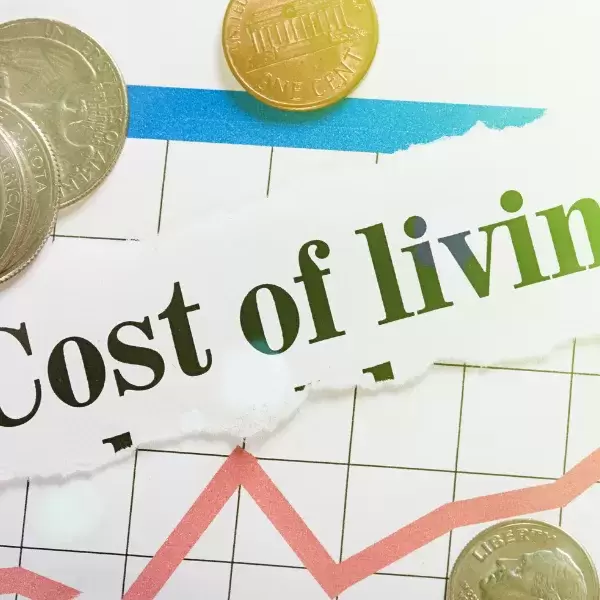Cost of living
As inflation is rising, pushing up the prices of food and other basic items, the UK is struggling with the biggest cost of living crisis in a generation. Many of us are likely to need help.
This guide outlines some sources of support: for migrants and Britons, for workers, pensioners, and parents, we could all do with a little support.
Some of these options, such as those related to benefits, depend on one's immigration status. But many are open to all households, such as the support with energy bill discounts, or the Council Tax Discount.
If you need help, or know someone who does, please reach out, you are not alone. If you want to contact our team, use the form at the bottom of this page.
This resource was produced by Work Rights Centre, who support people to access employment justice, and improve their social mobility.
On this page:
- Support for all households
- Support for parents
- If you are receiving benefits
- If you are receiving a pension
- If you are disabled
- If you have no recourse to public funds
- Regional help
- What can I do to drive real change?
Support for all households
Consider applying for Universal Credit
If you have access to public funds, Universal Credit is a government benefit that can help you cover living costs. If you are on a low income, out of work, or unable to work, you may be eligible for it. How much you get depends on your circumstances. If you are eligible you will be given a ‘basic allowance’, which ranges from £257.34 per month if you’re a single claimant under 25, to £509.92 if you are a couple making a joint claim, and one of you is 25 or over. You may also be able to claim other elements, such as housing or child benefit, which come with additional payments.
Visit the Work Rights Centre Universal Credit hub to find out whether you qualify, and gather any evidence you may need to submit your claim.
Energy bill discount
All households will receive a £400 energy bill discount from October 2022. This will be delivered automatically by energy suppliers, over the course of six months. You don’t need to contact your supplier or provide any bank details or other personal information.
If you have a traditional (i.e. not a ‘smart’) prepayment meter, you will receive a voucher or Special Action Message (SAM) each month for six months, which can be used to top up.
If you have a smart prepayment meter, credit will be added to it each month for six months.
You can read more about the different types of meter here.
Energy Price Guarantee
On 8th September 2022, the government announced that the OfGem price cap - which would have seen average bills rise to £3,549 on 1 October - would be replaced by their ‘Energy Price Guarantee’. This caps the maximum amount that energy providers can charge for units of gas/electricity, and will ensure that the annual bill for households with typical energy consumption levels to £2,500 for the next two years. When the Energy Bill Discount is factored in, this amount drops to £2,100.
You can read more about the government’s announcement here.
Council tax rebate
In response to rising costs, the government introduced a £150 council tax rebate for households living in council tax bands A – D who were liable to pay council tax from April 2022 onwards. This includes those who receive Local Council Tax Support and those who, while exempt from council tax, fall under the following categories:
- Class N (students - excluding HMOs where the landlord is liable to pay the council tax and not the occupants)
- Class S (under 18s)
- Class U (people with a severe mental impairment)
- Class W (annexes occupied by a dependent relative)
- If you pay your council tax by direct debit, your local council should make the payment directly to your bank account. They started making these payments in April 2022.
If you don’t pay your council tax by direct debit, your local council will contact you to explain how to claim your rebate. You can learn more here.
Help for Households
As part of the government’s ‘Help for Households’ scheme, many supermarkets and other retailers have committed to providing discounts and offers to help people manage the cost-of-living. This includes Asda’s ‘kids eat for £1’ scheme, which allows children aged 16 and under to buy a hot or cold meal for £1 at any time of day at one of its cafes. Click here for a full list of discounts and offers.
Water Bill Support
If you’re struggling to pay your water bills, contact your water company. Each of them has a social tariff scheme which can help reduce your bills if you’re on a low income. Some water companies also offer financial hardship funds, which offer access to grants that can help you clear down debt.
Support for parents
Free childcare
All 3 to 4-year-olds in England can get 570 free hours of childcare per year (15 hours per week). Some working families are eligible for up to 30 hours a week, but this is subject to a minimum earnings requirement. If you (and your partner if you have one) earn at least the National Minimum Wage for 16 hours a week on average, you may be eligible.
Find free early years education here.
Tax-free childcare
You may be able to benefit from the government’s tax-free childcare scheme for a child or children aged 11 or under (or disabled children aged 17 and under). You can get up to £500 every 3 months (up to £2,000 a year) for each of your children to help with the costs of childcare (or £1,000 every 3 months for disabled children).
Generally speaking, you’ll need to be working at least 16h a week, and expect to be paid at National Minimum Wage or above over the next three months, to be eligible.
If you are accepted for tax-free childcare, you will have to set up an online childcare account for your child. For every £8 you pay into it, the government will pay £2 in to help you pay an approved childcare provider.
Grant Funds
Turn2Us has a search tool, which you can use to find charitable grants you may be eligible for. Many of these grants are open to those who do not have recourse to public funds and can’t usually claim benefits.
If you are receiving benefits
Cost of living payment
If you receive means-tested benefits (e.g. Universal Credit) you might be entitled to receive a payment of £650, which will be paid in two lump sums. If you are eligible, you will be identified by the DWP and HMRC and paid automatically. There is no need to 'apply'.
To be eligible for the first sum, you must have been entitled to a Universal Credit payment (or later be found to be entitled to a payment) for an assessment period that ended in the period 26 April 2022 to 25 May 2022. The government has not yet announced the qualifying dates for the second sum, but it’s expected to be in the autumn.
Almost all of those due to receive their first payment of £326 in July have now got it. Payments are made in the same way you usually get your benefits or tax credit (e.g. to your bank account). However, some people haven’t yet received their first payment. If you are waiting for a decision on a benefit application or appeal, this could cause delays.
You can find out more about the cost of living payment, check if you are eligible or report a missed payment here.
Cold Weather Payment
From 1 November 2022, if you receive certain benefits, such as Income Support or Universal Credit, you may be eligible for cold weather payments if the average temperature in your area is recorded as, or forecast to be, zero degrees celsius (or below) for 7 consecutive days. For each of these 7-day periods you receive £25 (within 14 working days, paid into the same bank/building society account as your benefits).
Read more about the eligibility criteria here.
Warm Home Discount Scheme
If you’re eligible, you can get £150 off your energy bills in winter 2022-23. This discount, which is added as credit to your electricity account, is available to those in receipt of the Guarantee Credit element of Pension Credit, but also to those who are on a low income, in receipt of certain benefits or tax credits, and with an energy supplier that is part of the scheme. To find out if you are eligible and how to apply, get in touch with your energy supplier. Most eligible households will receive the Warm Home Discount automatically, without having to apply.
View a list of suppliers that are part of the scheme.
Watersure Scheme
This is a scheme that helps some people with their water bills. However, to be eligible you must be in receipt of benefits, including but not limited to Universal Credit, Pension Credit or Housing Benefit. You must also have a water meter (or be waiting for one to be installed) and have a high use of water either because of medical reasons or because your household has a high number of school-aged children. Ask your water company for a form to apply for Watersure and they should send you one.
Read more about the Watersure Scheme.
Childcare costs
Families on Universal Credit could have up to 85% of their childcare costs paid for by the government. You (and your partner if you have one) need to either be working or have a job offer. You can claim back costs up to £646 per month for one child or £1108 per month for two or more children.
All 3 to 4-year-olds in England can get 570 free hours of childcare per year (15 hours per week) but if you meet certain criteria (for example, if you receive Income Support), your two-year-old could get free childcare. The full criteria can be found here.
The Healthy Start Scheme
If you’re pregnant (10+ weeks) or have a child under 4, you might be eligible for the Healthy Start Scheme. To qualify you need to be receiving Universal Credit with a (family) monthly take-home pay of £408 or less, or Child Tax Credit with an (family) annual income of £16,190 or less. If you are eligible, you will receive a prepaid card that you can use at some shops to buy a selection of items, including cow’s milk, infant formula, fruit and vegetables, and vitamins.
How much will I get?
£4.25 each week of your pregnancy (from the 10th week onwards)
£8.50 each week for children aged 0-1 years.
£4.25 each week for children between the ages of 1-4.
Free School Meals
If your child is attending a state school, free school or academy in England, they may be able to get free school meals if you receive certain benefits. For example, if you receive Universal Credit and your household income is less than £7,400 per year after tax (not including any benefits you get). All infants (in reception, year 1 and year 2) are also eligible for free school meals.
To apply, you need to contact your local authority. You can check to see if your child can get free school meals and find out how to contact your local authority here.
School Uniform Grant
Some families in the UK can apply for a School Uniform Grant of up to £200 per child, per year. There are 27 local authorities that offer the grant, so it depends on where you live and your circumstances. You can check here.
Generally speaking, if your child receives free school meals, they should also be eligible for this grant. If your local council doesn’t provide this grant, you can always approach your child’s school directly to ask for assistance.
Six months' free broadband
If you are a jobseeker receiving Universal Credit and you don’t have an internet connection, speak to your JobCentre about TalkTalk’s offer of free broadband (no line) for six months.
'Social tariffs' for broadband
If you are receiving benefits, you could be able to apply for a social tariff. These are cheap, long-term tariffs for those on Universal Credit and some other benefits. Find out more at MoneySavingExpert.
Mobile phones
If you’re receiving benefits, including JSA and UC, this gives you unlimited data, calls and texts for £10 a month: https://www.voxi.co.uk/for-now
If you are receiving a pension
Pension Credit
If you are of state pension age and on low income (generally speaking, this means £200 or less weekly), you may be eligible to claim pension credit. The average amount people are able to claim is £65 per week, but this depends on your income (including basic and additional state pension), savings and whether or not you live with a partner.
There are two elements to pension credit: ‘guarantee credit’ and ‘savings credit’. The former tops up your weekly income, while the latter is a bonus to boost what you have managed to accrue in savings. You can apply for one part of pension credit and not the other. If you receive the main part of pension credit, you’ll also be entitled to other things, such as a free TV licence if you’re over 75.
Find out whether you are eligible and check how much you might get here or by calling the Pension Service helpline on 0800 99 1234.
Winter Fuel Payment
Pensioners (born on or before 25 September 1956) could receive between £250 and £600 to help with heating bills during the colder winter months. To be eligible, you must have lived in the UK for at least one day during the ‘qualifying week’ of 19 - 25 September 2022. If you live in another EEA country or Switzerland, you may also be eligible if you have a ‘genuine link with the UK’ (excluding Cyprus, France, Gibraltar, Greece, Malta, Portugal and Spain). For example: if you lived or worked in the UK previously, or have family here.
This year, an extra cost of living payment of up to £300 will be made to households who are eligible for the Winter Fuel Payment. Most payments should be issued automatically in November and December, or by January 2023 at the latest.
If you are disabled
From 20 September, people on qualifying disability benefits, including PIP and Attendance Allowance, will receive a one-off £150 disability cost-of-living payment. To be eligible, you must have received a payment of one of these qualifying benefits for 25 May 2022. The majority of payments will be made within a couple of weeks.
Support for carers
If you are aged 16+, and look after someone for more than 16 hours a week, you may be able to apply for Carer's Allowance, which is not means tested. If you are in receipt of a Carer’s Allowance, you can also get National Insurance credits. This is important because it helps to fill any gaps in your National Insurance record that occur because of your caring role. This, in turn, goes towards your state pension.
Please note: if someone else also cares for the same person, only one of you can claim Carer’s Allowance. For more advice, call Carer’s UK on 0800 808 7777.
Grant funds
Some organisations provide grants to support carers. An example is the Carers Trust Grant Fund, which provides up to £300 to carers over the age of 16, to fund an item or activity that helps you in your caring role. For more information, visit Carers Trust.
If you have no recourse to public funds
The government’s Household Support Fund is designed to help households that aren’t eligible for other kinds of help or need further support. It covers the cost of essentials such as food, clothing and utilities. In England, money from this fund is distributed to Local Authorities, so they can direct help to those who need it most. The scheme is set to run until March 2023. To find and contact your local authority, click here.
Support with Fuel
Energy bill discount
You should receive the £400 energy bill discount, regardless of your immigration status. If you are struggling, get in touch with your energy supplier to see if they have their own financial support initiatives. For example, Octopus Energy has set up a £7m ‘Octo Support Fund’ and can offer a number of support options based on your circumstances and needs.
Fuel Banks
You may also be able to benefit from Fuel Banks, which have been set up around the UK by Feeding Britain and the Fuel Bank Foundation. They provide two weeks’ emergency fuel credit to people on prepayment meters who are at risk of having their energy disconnected. The credit is available to people regardless of their energy supplier, meaning they can be given to any household in need.
Support with Housing
Council tax rebate
The £150 Council Tax Rebate is excluded from being considered a public fund under paragraph 6.2(i) of the Immigration Rules, so you should receive this if you live in an eligible property and have been liable for Council Tax there from April 2022.
Support with Food
The Healthy Start Scheme
If you’re not a British citizen, but your child is, you may still be able to access the Healthy Start Scheme. If you are pregnant (10+ weeks) or have a child under 4, the Scheme provides you with a prepaid card that you can use at some shops to buy a selection of items, including cow’s milk, infant formula, fruit and vegetables, and vitamins.
You will need to ask for an application form via email to [email protected]
Free school meals
If your child or children is/are in either reception, year one or year two, they can receive free school meals regardless of immigration status. For year three and above, decisions are made by local councils, with some providing free school meals to all children during primary school years. Other councils only allow children that meet certain eligibility criteria to receive free school meals from year three onwards.
Read more about the eligibility criteria and how to apply.
Food banks
Food banks located across the country, work with organisations like ours to get food vouchers to those in need. These vouchers can be exchanged for a parcel, which contains, on average, three days’ nutritionally balanced food, donated by the local community. Get in touch with Work Rights Centre - or Citizens Advice - if you need a referral for a food voucher.
FoodCycle
FoodCycle offers free hot meals to people who need it each week at a variety of locations across the UK. You don’t need to be referred; just turn up! Find your nearest location here.
The Community Fridge Network
Did you know that local businesses, producers and individuals can give surplus food to Community Fridges, which are located in public spaces across the UK. The Network, which currently has more than 300 fridges, is coordinated by environmental charity Hubbub. Find your nearest fridge here.
Olio
Olio is an app that you can use to find and collect free, surplus food (and some non-food items). You can browse ‘listings’ near you and arrange where and when to collect it. Mostly, this will be on someone’s doorstep, but you can arrange to meet somewhere more public if you prefer.
‘Kids eat for £1’
As part of the government’s Help for Households scheme, where businesses sign up to offer discounts to shoppers, Asda has extended its ‘kids eat for £1’ scheme, allowing children aged 16 and under to buy a hot or cold meal for £1 at any time of day at one of its cafes. Click here for a full list of discounts and offers from businesses.
Inflation Calculator
The Office for National Statistics (ONS) has created an inflation calculator, which you can use to estimate how much your monthly spend has increased over the past year and identify which items are contributing more to those cost-of-living increases.
Support with Childcare
Free childcare
All 3 to 4-year-olds in England can get 570 free hours of childcare per year (15 hours per week), regardless of immigration status.
Some working families are eligible for up to 30 hours a week, but this is subject to a minimum earnings requirement. In addition, the parent who applies must be a British/Irish citizen, or have pre-settled or settled status under the EUSS (or a pending application) or immigration permission that allows access to public funds (refugee status, for example).
Your 2-year-old may be eligible to get free childcare if your household income is £15,400 a year or less after tax, even if you have leave to remain with ‘no recourse to public funds’. The full criteria can be found here.
Child maintenance
If you can’t arrange to get child maintenance directly with your child’s other parent, you can apply for payments through the government’s Child Maintenance Service. They can work out an amount to pay, take action if it isn’t paid and try to find the other parent if you don’t know where they are. This is not a public fund, and the service can help you even if you do not want your child’s other parent to know where you are because of domestic abuse or coercive/controlling behaviour.
Child Benefit
You may be able to claim Child Benefit even if you have NRPF if you have come to live in the UK from a country that has a reciprocal social security agreement with the UK which covers Child Benefit. Countries that have such an agreement are:
- Barbados
- Canada
- Israel
- Jersey and Guernsey
- Mauritius
- New Zealand
- Bosnia-Herzegovina
- Serbia
- Montenegro
- North Macedonia
- Kosovo
- Switzerland
Regional help
The Bread and Butter Thing(TBBT) - Greater Manchester, Leeds and surrounding areas, Newcastle-upon-Tyne and surrounding areas
You can become a member of TBBT for free. Once you’ve joined, they will text you each week to see if you want to use their service. If you reply ‘yes’, you can go and pick up a bag (or bags) of groceries, made up of surplus food from shops and farmers, from your local community hub. This costs £7.50, which you can pay when you collect, but you will get roughly £35 worth of items, and TBBT also accepts Healthy Start Vouchers.
Freedom4Girls - Leeds and Sheffield
Freedom4Girls provides period products to those in need, taking donations of these items from businesses and individuals and distributing them. To request products, contact them.
Living Life to the Full - Greater Manchester
This online resource is completely free to anyone living in Greater Manchester. It offers online courses to help you with mental health challenges such as low mood. You can sign up to access these resources here.
What can I do to drive real change?
While this guide is focused on helping people to meet their immediate needs, it is clear that longer-term, systemic change is needed to alleviate the pressure of today’s cost-of-living crisis from those least able to bear it. So, what can we do to create positive change?
Write to your MP
When lots of people write to their MP about a certain issue, it puts pressure on them to act. Turn2Us has a useful tool to help you structure your letter and you can search for your local MP here.
Make your voice heard
The campaign group ‘Enough is Enough’ is organising rallies across the UK as part of its ambition to tackle the cost-of-living crisis. To find an event near you, visit their website.



